Old News
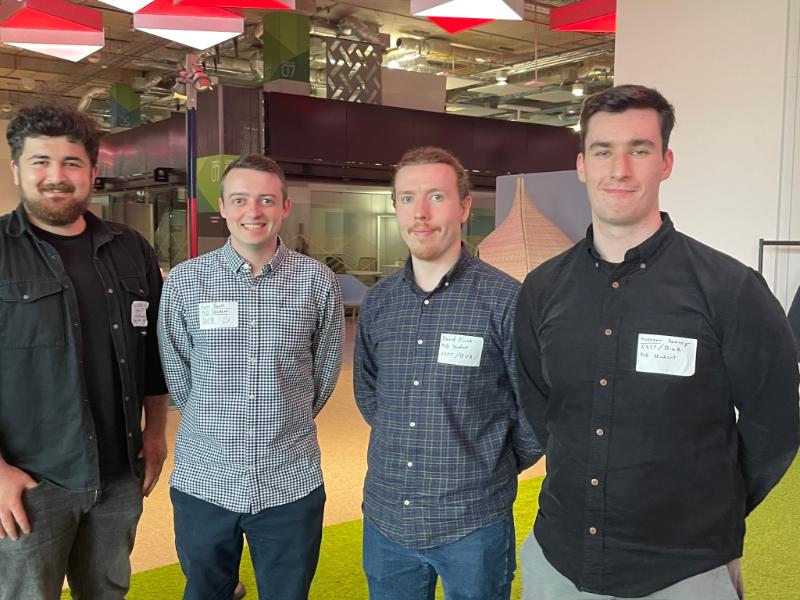
Four of our Cyber AI students, Ryan Bevin, David Kirch, Alperen Bloat, and Matthew Reaney, recently attended the SPRITE+ Academic, Public Sector, and Industry Engagement Event held on June 7, 2024, at Plexal. This event provided a platform for our students to present their cutting-edge research to industry leaders, aiming to foster further engagement and collaboration.
This event provided a platform for our students to present their cutting-edge research to industry leaders, aiming to foster further engagement and collaboration.
SPRITE+ is a UK-wide network that brings together researchers, industry professionals, and public sector representatives to address challenges in cybersecurity, privacy, identity, and trust. SPRITE+ Co-director Professor Sakir Sezer of CSIT plays a pivotal role in this network, contributing to the development and dissemination of innovative cybersecurity solutions.
During the event, Ryan, David, Alperen, and Matthew presented their innovative projects in 3 minute pitches, receiving valuable feedback and insights from both industry professionals and fellow academics. This interaction not only highlighted the practical applications of their research but also opened doors for potential future partnerships.
The event, hosted at Plexal, a renowned innovation hub in London dedicated to supporting startups and scaleups in technology and cybersecurity, also featured a series of presentations from other academics, offering a broader perspective on current trends and challenges in the field. This experience has been instrumental in enriching our students' academic journey and aligning their research with industry needs.
We are proud of our students' achievements and look forward to seeing the impact of their work in the cybersecurity landscape.
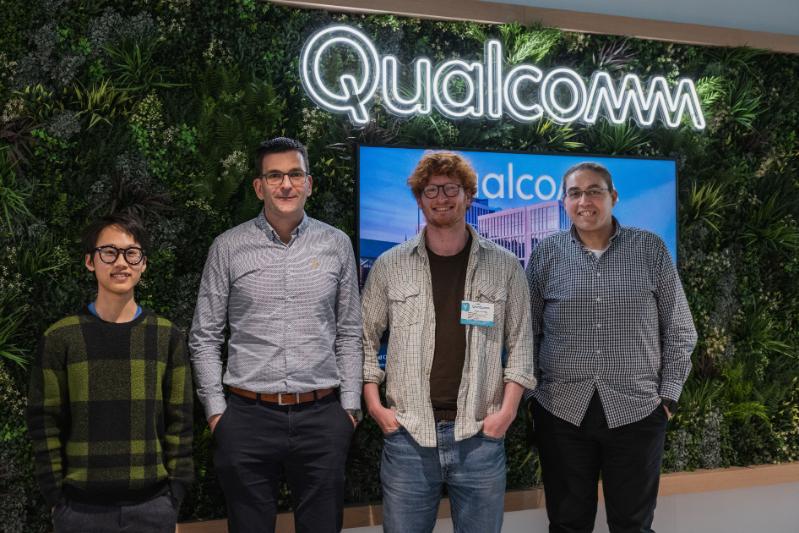
On the 18th May,
Cyber AI DTP students Niall Canavan and Tuan Dung Pham visited Qualcomm's facility in Cork for a day of presentations, networking, and collaboration. Qualcomm, as a valued industry partner, supports the students' research projects, making this visit a significant opportunity to strengthen the academia-industry relationship.
Niall and Tuan arrived at Qualcomm's Penrose Dock Building and were greeted warmly by the Qualcomm team. After checking in and a brief tour of the facility, the students prepared for their main engagement—a presentation of their cutting-edge research in cybersecurity.
Niall and Tuan presented their work to an audience of over 50 Qualcomm security team members, both in person and online from Cork and the France site. Their presentation was well-received, sparking numerous questions and lively discussions. This interaction provided the students with invaluable feedback, aligning their research more closely with industry needs and expectations. A quick photo session followed, capturing the collaborative spirit of the event.
The visit concluded with a lunch session, allowing for further informal discussions and networking. Niall and Tuan had the opportunity to connect more personally with Qualcomm’s team, discussing potential future collaborations and gaining deeper industry-specific insights.
This visit to Qualcomm was a resounding success, providing Niall and Tuan with enhanced perspectives on their research, valuable industry feedback, and meaningful connections for future collaboration. The positive reception from Qualcomm validates the importance and impact of their work, exemplifying the mutual benefits of academia-industry engagements.
We extend our gratitude to the Qualcomm team for their warm hospitality and support. This visit marks a promising step towards stronger ties between the Cyber AI DTP program and industry leaders like Qualcomm.
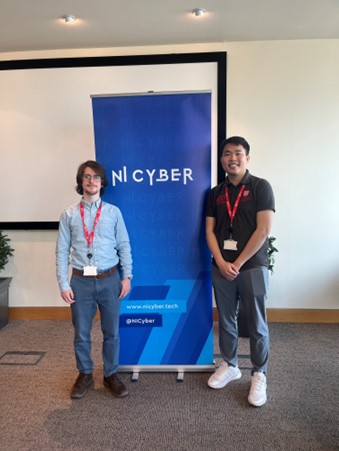
Mark Megarry and An To Truong were invited to give an overview of their research into securing 6G networks with attendees at the NI Cyber breakfast in April.
As the cybersecurity landscape continues to evolve, initiatives like these play a pivotal role in nurturing the next generation of cybersecurity leaders and driving impactful research that strengthens our digital defenses against emerging threats.
Mark's presentation focused on leveraging machine learning algorithms to enhance anomaly detection in network traffic, a critical aspect of cybersecurity defense mechanisms. The research showcased how advanced AI techniques can significantly improve the ability to identify and respond to malicious activities in real-time, thus fortifying cyber defenses against evolving threats.
An To delved into the realm of secure and privacy-preserving data sharing techniques, addressing the growing need for robust methods to exchange sensitive information while safeguarding individual privacy rights. This research sheds light on novel encryption protocols and access control mechanisms designed to enable secure data collaboration across disparate entities without compromising confidentiality.
Both presentations received enthusiastic feedback from the NI Cyber community, underscoring the importance of fostering collaboration between academia and industry in tackling cybersecurity challenges. The event not only provided valuable exposure for the students but also facilitated knowledge exchange and networking opportunities crucial for advancing cybersecurity innovation in Northern Ireland and beyond.
As the cybersecurity landscape continues to evolve, initiatives like these play a pivotal role in nurturing the next generation of cybersecurity leaders and driving impactful research that strengthens our digital defenses against emerging threats.
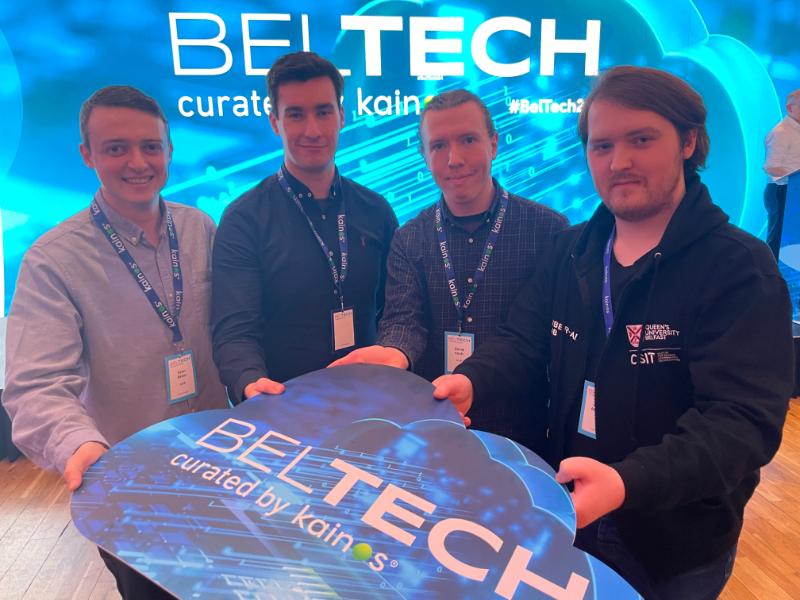
Staying abreast of the latest developments is paramount, especially in the realm of cybersecurity and artificial intelligence (AI). Recently, four PHD students from Queen's University Belfast's Cyber AI Doctoral Training Partnership (DTP) had the opportunity to immerse themselves in the forefront of technological innovation at the prestigious Beltech Conference.
Beltech, renowned for its fusion of technology, innovation, and industry insights, provided an ideal platform for these budding cybersecurity and AI experts to expand their knowledge horizons. Let's take a closer look at their experiences:
"Attending Beltech was interesting as it allowed me to see how different companies in industry are utilising AI and how I could utilise AI technologies, such as Github Copilot, to improve the development of my research code.
Additionally it was great to see industry advances in cybersecurity. Talks on areas such as Post-Quantum Cryptography, with Marcin Pawlowski, and Zero Trust Architecture with Jing Xu helped explain the cutting edge in cybersecurity with great levels of clarity. "
Joshua Andrews
"I found the GitHub Co-pilot deep dive very useful. It was given by the vice president Martin Woodward. I was always hesitant about using something like this but I find it might be useful for me and my code development."
Ryan Bevin
"I enjoyed attending Beltech, the combination of industry and academic talks provided a valuable insight into the direction that AI and cybersecurity is taking in Belfast and further afield. It is clear that the way we develop applications is going to change with the introduction of tools like GitHub Copilot and Amazon CodeWhisper, which leverage AI to provide predictive suggestions and analysis on code."
David Kirch
"Beltech helped to demonstrate how the commercial world is adopting the latest academic tools and research. With a great range of speakers from local industry on a wide range of topics, I'm excited to see what they plan to present next year."
Matthew Reaney
Together these students epitomise the spirit of innovation and inquiry fostered by the QUB Cyber AI DTP. Their participation in the Beltech Conference not only enriched their own understanding but also contributed to the collective discourse surrounding cybersecurity and AI. As they return to their academic pursuits, they carry with them a wealth of insights and experiences that will undoubtedly shape their future endeavours in the dynamic landscape of cybersecurity and artificial intelligence.
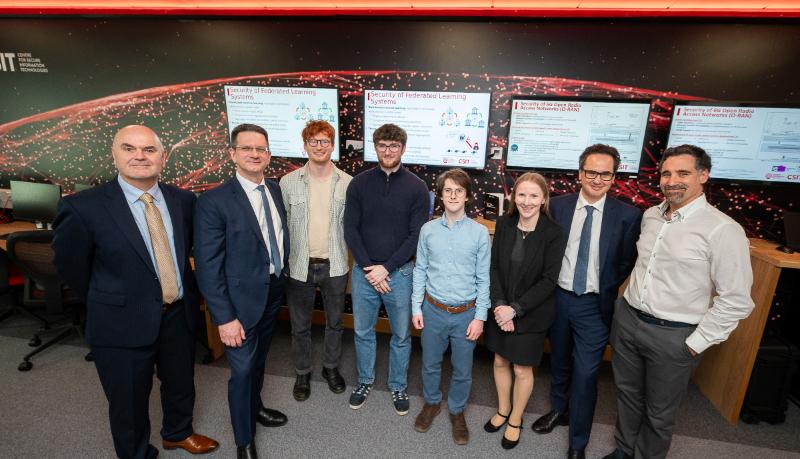
The Centre for Secure Information Technologies (CSIT) welcomed Minister Baker and Viscount Camrose as part of their visit to Belfast for CyberNI Week celebrations. CSIT proudly showcased the progress made by the Cyber-AI Hub one year after the initial funding announcement.
During their visit to CSIT, the Ministers had the opportunity to engage with key industry partners of the Cyber-AI Hub, gaining insights into the cutting-edge technologies and collaborative efforts driving advancements in cybersecurity. Additionally, the Ministers were invited to interact with PhD students Mark Megarry, Niall Canavan and Ryan McGaughey.
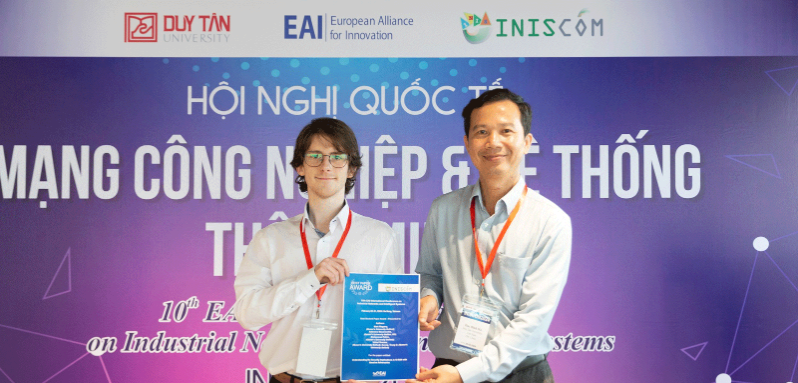
Mark Megarry, funded under CSIT’s Doctoral Training Programme in the School of Electronics, Electrical Engineering, and Computer Science (EEECS), received the award for the paper titled Understanding the Security Implications in O-RAN with Abusive Adversaries. Co-authored with Antonino Masaracchia, Muhammad Fahim, Vishal Sharma, and Trung Q. Duong of Queen's University Belfast, the paper highlights groundbreaking research on enhancing security measures within O-RAN architecture to counteract abusive adversaries effectively.
The Centre for Secure Information Technologies (CSIT) at Queen's University Belfast proudly announces that Mark Megarry, a PhD student, won the ‘Best Student Paper Award’ at the International Conference on Industrial Networks and Intelligent Systems (INISCOM) held in February 2024. This prestigious recognition highlights CSIT's commitment to advancing research and innovation in cybersecurity.
Mark Megarry, funded under CSIT’s Doctoral Training Programme in the School of Electronics, Electrical Engineering, and Computer Science (EEECS), received the award for the paper titled Understanding the Security Implications in O-RAN with Abusive Adversaries. Co-authored with Antonino Masaracchia, Muhammad Fahim, Vishal Sharma, and Trung Q. Duong of Queen's University Belfast, the paper highlights groundbreaking research on enhancing security measures within O-RAN architecture to counteract abusive adversaries effectively.
The awarded paper discusses the challenges posed by abusive adversaries in O-RAN systems, using a novel approach that combines Markov Decision Processes (MDP) and Fuzzy Inference Systems (FIS) to predict and mitigate potential Denial of Service (DoS) attacks. This innovative research provides valuable insights for network operators on securing offloading operations against sophisticated cyber threats.
Upon receiving the award, Mark commented, “It is an honour to receive this award so early in my PhD studies. I’m extremely thankful for the support from my co-authors and supervisors, and for the efforts of the conference organisers. With the continued support of Queen’s University Belfast and CSIT, we aim to continue investigating emerging threats against O-RAN networks to secure tomorrow’s communications.
Dr. Vishal Sharma, one of Mark's supervisors and co-authors, also shared his thoughts: "Mark's dedication and our team's hard work have led to this significant achievement. We are grateful for this recognition by INISCOM's programme committee, and it encourages us to continue our pursuit of innovative solutions to protect against cyber threats in open networks."
For more information on the award and INISCOM please visit https://iniscom.eai-conferences.org/2024/
